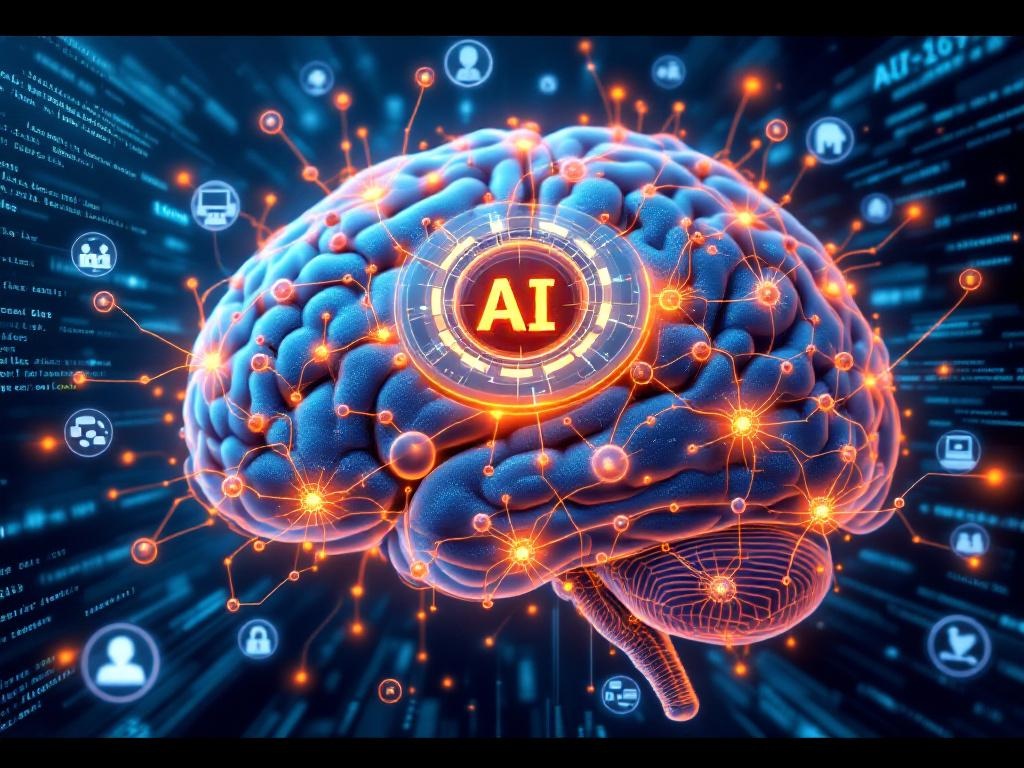Sector-specific AI models are transforming healthcare diagnostics by leveraging specialized training to analyze domain-specific data. This article delves into how these advanced algorithms enhance medical insights in fields such as oncology, cardiology, and genomics.
The Pivotal Role of Specialized AI in Diagnostic Accuracy
The transformative power of sector-specific AI models in healthcare diagnostics brings to light an era where precision medicine not merely exists as an aspiration but thrives as a practical reality. Riding on the back of specialized training in domain-specific medical data, these AI-driven tools have markedly improved the accuracy and efficiency in healthcare diagnostics. This leap in technological sophistication paves the way for enhancing precision medicine, which is fundamentally about tailoring treatment to the individual patient. Precision medicine’s core objective is to leverage detailed genetic and molecular information to optimize the efficacy of healthcare.
In the vanguard of this evolution are AI applications in genomic analysis, an area where the precision of data interpretation can significantly alter treatment outcomes. Through the analysis of genetic sequences, AI models are unravelling complexities of the human genome at an unprecedented scale, enabling healthcare professionals to identify genetic mutations and anomalies linked to diseases. This precision in genomic analysis heralds a new chapter in the creation of personalized treatment plans, moving beyond the one-size-fits-all approach.
Moreover, AI’s role in medical imaging interpretation exemplifies another cornerstone in the enhancement of precision medicine. AI algorithms, trained on vast datasets of medical images, bring forth the ability to pinpoint minute anomalies that the human eye might overlook. Such precision not only aids in the early detection of diseases such as cancer but also assists in monitoring disease progression and response to treatment. Consequently, this advanced level of interpretation supports clinician decisions in devising highly personalized treatment plans, increasing the likelihood of successful outcomes.
The integration of AI in precision medicine extends to the creation of personalized treatment plans. Leveraged data from genetic analysis and medical imaging interpretation are combined with other patient-specific information, encompassing lifestyle, environment, and existing health conditions. This holistic view provided by AI-driven analytics enables healthcare professionals to design treatment strategies that are uniquely suited to each patient’s individual needs and biological makeup. Such personalized interventions are not only more effective but can also reduce side-effects and improve patient quality of life.
AI’s predictive analytics capability further refines the precision in medicine by foreseeing potential health risks and disease vulnerabilities within individual patients. Predictive models analyze patterns across vast datasets of patient records and genetic information to forecast health outcomes, enabling preventive measures to be taken much earlier. The proactive nature of such interventions epitomizes the shift towards a more predictive, preventive, and personalized healthcare paradigm.
The synergy between AI and precision medicine represents a natural progression towards a more nuanced understanding of patient care, where decisions are data-driven and deeply individualized. Amidst this convergence, sector-specific AI models stand as pivotal contributors, transforming vast arrays of data into actionable insights. These insights, when applied within the precision medicine framework, promise not just improved health outcomes but a revolution in how healthcare is delivered—a testament to the collective strides in AI and medicine.
The integration of sector-specific AI in healthcare diagnostics, therefore, is not just improving diagnostic accuracy and efficiency, but it is also fundamentally altering the landscape of treatment planning and patient care. As we continue to merge the capabilities of AI with the principles of precision medicine, the potential for customized healthcare solutions grows exponentially, ushering in an era of medicine that is as precise as it is personalized.
Enhancing Precision Medicine with AI
In the realm of healthcare diagnostics, the advancement and incorporation of sector-specific AI models have been pivotal in transcending traditional diagnostic methodologies. These models bring forth an era of precision medicine, where tailor-made diagnostic and treatment plans are formulated based on each patient’s unique genetic makeup, lifestyle, and environmental factors. The utilization of AI in precision medicine, particularly in genomic analysis and medical imaging interpretation, marks a significant leap towards more customized, effective patient care. This transition underlines the shift from a one-size-fits-all treatment approach to a more nuanced, personalized strategy.
One of the most groundbreaking applications of AI in precision medicine is in the field of genomic analysis. Genomics, the study of an individual’s genes and their functions, is a critical component of precision medicine. AI algorithms, specifically designed for genomics, sift through and analyze vast datasets of genetic information at a speed and accuracy unattainable by humans. These algorithms can detect minuscule genetic variations that may predict an individual’s susceptibility to certain diseases or conditions, or their likely response to various treatments. This capability enables the development of personalized treatment plans that are significantly more effective because they are based on the individual’s genetic profile. Such precision not only enhances treatment efficacy but also mitigates the risk of adverse reactions, paving the way for safer healthcare outcomes.
Moreover, the integration of AI in medical imaging has profoundly improved the interpretation of images such as X-rays, CT scans, and MRIs. Through advanced image recognition and analysis technologies, AI models dedicated to medical imaging can distinguish between benign and malignant tumors with unprecedented precision. This accuracy is crucial in fields like oncology, where early detection and treatment can dramatically affect patient outcomes. Furthermore, AI-driven image analysis expedites the diagnostic process, enabling healthcare providers to make faster, more informed decisions regarding patient care. The ability to quickly and accurately interpret medical images not only enhances diagnostic accuracy but also significantly impacts treatment planning and monitoring, ensuring that each patient receives the most effective interventions tailored to their specific condition.
Central to the efficacy of these AI applications is the continuous learning process, where AI algorithms are constantly fed new data. This perpetual cycle of learning and adaptation ensures that AI models remain at the forefront of diagnostic and treatment practices, continually enhancing their accuracy and effectiveness. The implications of such advancements extend beyond individual patient care to influence research and development within the healthcare sector, fostering a deeper understanding of complex diseases and facilitating the creation of innovative treatments.
The inclusion of AI in precision medicine is not without its challenges, including ethical considerations around data privacy and the need for robust regulatory frameworks to ensure the safe and equitable use of AI technologies. However, the potential benefits of AI-driven precision medicine—increased diagnostic accuracy, personalized treatment plans, and improved patient outcomes—present a compelling case for continued investment and exploration in this field.
By harnessing the power of sector-specific AI models, the healthcare industry is making significant strides towards realizing the full potential of precision medicine. Through the detailed analysis of genomics and enhanced interpretation of medical imaging, AI is enabling healthcare professionals to tailor treatments to the unique needs of each patient, heralding a new era of personalized, efficient, and effective care that promises to transform patient outcomes on a global scale.
Predictive Analytics: A Game Changer in Patient Outcomes
The advent of artificial intelligence (AI) in healthcare diagnostics, particularly through sector-specific AI models, has led to a revolutionary shift in how medical professionals approach diagnostics and patient care. Among the various applications of these technologies, predictive analytics stands out as a particularly transformative tool, significantly influencing patient outcomes and clinical decision-making processes. The integration of AI models specialized in predictive analytics harnesses the power of patient data and electronic health records (EHR) to forecast potential disease trajectories and mitigate risks before they manifest into more severe conditions.
At the heart of predictive analytics in healthcare is the utilization of vast amounts of data generated from multiple sources, including EHRs, imaging, lab results, and bio-signals such as ECG and EEG. AI algorithms analyze this data in real-time, offering healthcare providers a dynamic tool to anticipate adverse events, detect early signs of deterioration in patient health, and personalize treatment plans. For example, by leveraging historical and real-time patient data, AI can predict the likelihood of hospital readmissions, the risk of developing specific complications, or the prognosis of chronic diseases with remarkable accuracy.
Moreover, predictive analytics extends its benefits to chronic disease management, where AI models help in identifying patients at high risk of developing diseases such as diabetes, heart conditions, or specific cancer types. Through predictive risk scoring, healthcare professionals can prioritize interventions, recommend lifestyle adjustments, and closely monitor high-risk patients, thereby preventing the onset of diseases or managing them more effectively from an early stage.
The implementation of predictive analytics in clinical decision support systems has demonstrated significant outcomes, enhancing the efficiency and effectiveness of healthcare delivery. Clinical decision support systems integrated with AI-based predictive analytics offer recommendations and alerts to healthcare practitioners, aiding in decision-making processes that are more informed and data-driven. This technology is especially crucial in emergency and acute care settings, where time-sensitive decisions can determine patient outcomes. For instance, AI algorithms quickly analyze critical data points to identify patients at immediate risk of sepsis, allowing for rapid intervention and significantly improving recovery rates.
Fueled by advancements in AI and machine learning, predictive analytics is experiencing rapid growth and adoption across various healthcare settings. Collaborative efforts between data scientists, healthcare professionals, and tech companies are crucial in developing models that are not only accurate but also adaptable to the nuances of individual patient care. These collaborations ensure that AI-driven tools are continually learning and evolving, further enhancing their predictive capabilities and reliability.
In this evolving landscape, regulatory bodies and healthcare organizations are also working to establish guidelines and standards to ensure the ethical use of AI in healthcare, maintaining patient privacy, and securing data. As these frameworks take shape, they will play a vital role in facilitating the widespread adoption of predictive analytics, ensuring that the benefits of this technology are realized across the healthcare sector.
As we move towards a future where healthcare is increasingly personalized and preventive, the role of predictive analytics in shaping patient outcomes and clinical decision-making continues to grow. With each successful application, the potential of AI to transform healthcare becomes more evident, promising a future where diagnostics, treatment, and patient care are more precise, efficient, and patient-centered. These technological advancements not only complement the insights gained from sector-specific AI models in diagnostics but also bridge the gap to the subsequent focus on real-world transformations, showcasing the clinical impact of AI across the healthcare spectrum.
Real-World Transformations: AI’s Clinical Impact
In the realm of healthcare diagnostics, the implementation of sector-specific AI models has revolutionized the accuracy and efficiency of patient care services. These models, honed through extensive training on domain-specific data, are fundamentally altering the landscape of diagnostic processes. Following the insights into predictive analytics and its transformative impact on patient outcomes outlined in the previous chapter, this chapter delves into the tangible, real-world transformations achieved through the adoption of tailored AI technologies in clinical settings.
One of the key areas where sector-specific AI models have shown remarkable efficacy is in the rapid and accurate diagnosis of diseases. For instance, AI-driven diagnostic tools in radiology have significantly outstripped traditional diagnostic methods in speed and precision. The Mercy Health System’s integration of an FDA-approved AI platform for analyzing CT scans is a prime example of this advancement. By flagging critical cases such as strokes swiftly, the system has notably accelerated the process from diagnosis to treatment initiation.
The burgeoning field of radiology diagnostics stands out, showcasing nearly 400 FDA-approved AI algorithms dedicated to this specialty. Each of these algorithms is a testament to the potential of sector-specific AI in enhancing diagnostic accuracy, exemplified by reports of AI tools achieving up to 99.6% accuracy in cardiac event detections. The profound impact of these tools stretches beyond mere numbers, translating into saved lives and improved patient recovery trajectories through timely and accurate diagnoses.
Furthermore, the role of AI in precision medicine, particularly through genomics, underscores the relevance of sector-specific models. The detailed analysis of genetic data by AI has brided the gap between genetic variants and their implications on treatment and disease susceptibility. Through the lens of precision medicine, AI’s capacity to sift through genomic sequences and identify critical mutations offers transformative potential in treatment planning and disease management. The medulloblastoma case study, wherein AI unravelled the molecular subgroups affecting treatment dosing, exemplifies the precise, tailored treatment strategies enabled by sector-specific AI.
Moreover, predictive analytics, leveraging patient-specific data, have found enhanced applications in clinical decision support systems. Hospitals collaborating to integrate AI models in their clinical workflows have reported substantial improvements in patient management. These AI systems, equipped to analyze electronic health records, bio-signals, and other clinical data, have empowered healthcare providers to make informed decisions, forecast disease progression, and mitigate readmission risks with unprecedented accuracy.
The transition towards sector-specific AI in healthcare diagnostics is not merely a technological upgrade but a paradigm shift in how healthcare providers approach diagnosis and treatment. By harnessing the power of specialized algorithms, healthcare professionals are now equipped with tools that offer deeper insights into patient data, enabling a level of personalized care previously unattainable. As this chapter seamlessly connects the predictive analytics discussion to the imminent future of AI-driven diagnostics, it becomes evident that the integration of sector-specific AI models is not just an improvement but a transformation of diagnostic processes and patient care.
As we edge closer to the future of healthcare diagnostics, outlined in the following chapter, the foundation laid by sector-specific AI models provides a robust framework for the development of even more advanced and precise diagnostic tools. The promise of further enhancements in AI technologies suggests an era of healthcare where diagnostic accuracy, efficiency, and personalized care converge to offer unparalleled patient outcomes.
The Future of Healthcare: AI-Driven Diagnostics
The evolution of Artificial Intelligence (AI) in healthcare diagnostics is reaching an unprecedented level of sophistication, driven by sector-specific models that have fine-tuned the accuracy of medical diagnoses and personalized treatment plans. The harnessing of AI in precision medicine, particularly through sector-specific models, heralds a new era where the capabilities of healthcare diagnostics are vastly expanded, offering hope for groundbreaking improvements in patient outcomes. The current trajectory suggests that we are only at the cusp of unlocking the full potential of AI in healthcare, with future advancements poised to redefine the paradigms of medical diagnostics and treatment.
As we delve deeper into the implications of sector-specific AI models, it becomes apparent that they are the linchpins in the transformation of healthcare diagnostics. These models are not generalized; instead, they are intricately designed with algorithms tailored to recognize and analyze the nuances of diseases within specific medical fields such as oncology, cardiology, and genomics. The significant performance boost attributed to these specialized AI models is a testament to their potential. With diagnostics improvement rates soaring, these AI-driven technologies are setting a new benchmark for what is achievable in the realm of healthcare.
The specificity of these AI models allows them to process and interpret complex medical data with a level of precision that is unrivaled. This capability is particularly crucial in fields like genomics, where the detection of minute genetic variations can have profound implications for disease diagnosis and treatment. The integration of AI in precision medicine is enabling a more nuanced understanding of individual patient profiles, paving the way for truly personalized treatment plans that are tailored to the genetic makeup and specific health nuances of each patient.
Looking ahead, the potential for further advancements in AI-driven diagnostics is staggering. The ongoing trend towards developing more tailored AI algorithms for specific medical sectors is likely to yield even more sophisticated diagnostic tools. These advancements could lead to the discovery of previously undetectable disease markers, offering the possibility for earlier and more accurate diagnoses. Moreover, the continued refinement of predictive analytics capabilities will enhance clinical decision support systems, enabling healthcare providers to make more informed decisions about patient care, potentially even forecasting disease onset before clinical symptoms manifest.
The implications of these anticipated advancements extend far beyond the immediate improvements in diagnostic accuracy and efficiency. They signify a shift towards a more proactive and preventive approach to healthcare, where diseases can be intercepted at their earliest stages, and treatment plans are optimized for efficacy. This shift not only has the potential to significantly improve patient outcomes but also to reduce the overall burden on healthcare systems by mitigating the need for extensive treatments and hospitalizations.
The seamless integration of sector-specific AI models into healthcare workflows will likely become more streamlined, as interoperability standards and data-sharing protocols evolve to support the more widespread adoption of these technologies. Furthermore, ethical considerations and privacy concerns related to AI in healthcare will continue to be addressed, ensuring that the benefits of these advancements are realized in a way that respects patient rights and data security.
As we stand on the brink of this new frontier in healthcare, the promise of AI-driven diagnostics in revolutionizing patient care is more tangible than ever. The journey towards fully unlocking this potential is fraught with challenges, including technical, regulatory, and ethical hurdles. However, the progress made thus far gives ample reason for optimism, suggesting that the future of healthcare may well be defined by the precision and personalization enabled by AI.
Conclusions
AI’s sector-specific approach in healthcare diagnostics marks a technological leap, enhancing precision and prognosis. By honing in on domain-specific datasets, AI achieves a remarkable uptick in performance, reshaping the future of patient care.



